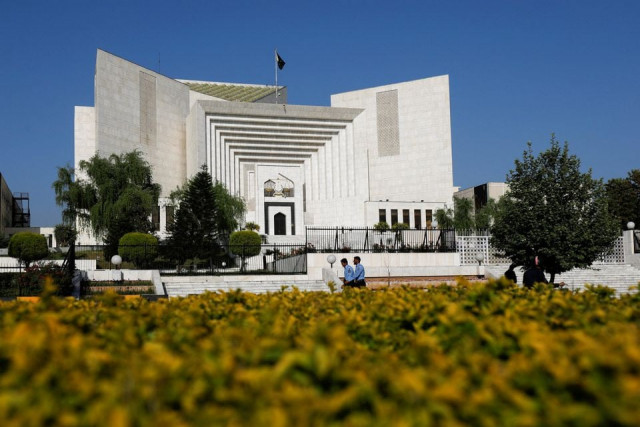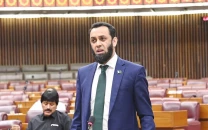CJ snubs AGP's request for full court
Bench reconstituted after Justice Mandokhail recuses himself from hearing poll delay case

The Supreme Court on Friday rejected a request by Attorney General for Pakistan (AGP) Mansoor Awan for the formation of a full court as it continued hearing the PTI's petition against the Election Commission of Pakistan’s (ECP) delay in the Punjab Assembly polls.
Chief Justice of Pakistan Umar Ata Bandial observed that neither the law nor rules mentioned the composition of a full court and the SC would not return to the start as the matter was being heard since Monday.
The hearing of the case continued after two judges -- Justice Aminuddin Khan and Justice Jamal Khan Mandokhail -- recused themselves from the five-member bench.
On Friday, a three-member bench led by CJP Bandial, resumed the hearing of the matter with Hassan Raza Pasha, the chairperson of the Pakistan Bar Council’s (PBC) Executive Council, present before the apex court.
The top judge maintained that the PBC office-holder would be heard later.
To This, Pasha said the bar had nothing to do with supporting anyone.
He suggested that the SC should hold a full-court session.
That was in case a full-court bench could not be formed, he added.
The CJP noted that the bench was considering taking that measure, adding that the relationship between the judges was “good”.
Pasha, however, pointed out that on Thursday and Friday, two judges had recused themselves from hearing the matter.
The CJP told Pasha to meet him in his chambers on that issue.
“Today is the first time you have come to the court, prove yourself by actions, not by words,” Justice Bandial advised, reinviting Pasha to his chambers.
He added that the president of the Supreme Court Bar Association (SCBA) had been in touch with him.
“Our lives would have been peaceful if it was only about the external image.
Media personnel also sometimes report ‘wrong things',” the chief justice noted, insisting that the court had always showed restraint.
Justice Bandial maintained that he would conduct some meetings after the hearing and hoped that “Monday’s sun would rise with good news”.
The chief justice observed that the AGP could raise whatever point he wanted to.
To this, the AGP requested the court to "lower the rising temperatures across the country" -- signalling to the turmoil rising from the disagreement within the court itself.
When asked by the CJP what the AGP had done to lower the temperatures, he replied that "temperatures might reduce over time".
Justice Bandial maintained that the court had always given precedence to the Constitution.
“[The] Constitution is very important for us; for this nation; for this society; it holds the federation together; it keeps alive democracy,” he noted.
“Today when you go to parliament, you find people addressing the [House] who were till yesterday in captivity, imprisoned, declared traitors; they are now talking over there, and being respected; because they are representatives of the people,” he added.
Commenting on the case, the CJP observed that the 90-day deadline for holding the Punjab Assembly polls as per the Constitution expired in April.
The chief justice continued that the president was supposed to give the date 15 days after the stipulated 90-day period.
He added that the ECP had not informed the president about the security situation and the problems associated with holding the polls on April 30.
“If the president had been informed about the situation, the date of April 30 might not have been suggested,” he continued.
The top judge noted that the matter of holding the elections on October 8 was brought before the court, which did not want to create more problems.
The CJP directed the parties to give a solid reasoning or initiate a dialogue.
“The term of the assemblies will also be completed in August. If there are negotiations between the government and opposition, a break will be taken for a few days. However, if negotiations do not take place, constitutional roles will be played,” he added.
Justice Bandial observed that if a dialogue took place, the points of all participating sides would be mentioned in the judgment.
He also inquired about the expenses of Rs20 billion to hold separate elections and the security issue with half the polling stations categorised as “highly sensitive”.
Referring to the reason given earlier which highlighted terrorism in the country, Justice Bandial observed that such elements were present since the 90s.
He added that the court was told that the forces were busy at the borders and that the matter would also have to be looked into.
The AGP highlighted that the court would have to observe the circular issued by the CJP and read the note of Justice Mandokhail after he left the bench.
He added that the second matter was the ratio of the judgment of March 1, as well as the order issued on that day as the current petition was based on that.
“Two members of the nine-judge bench recused themselves from the bench voluntarily,” the AGP said.
On the CJP’s inquiry, the AGP read out the court order dated February 27 where the matter was referred to the top judge for the reconstitution of the bench.
The AGP maintained that the CJP had stated that the judges had not recused themselves from hearing the case.
To this, Justice Bandial replied that he had not mentioned anything in that connection.
The CJP observed that the judges would discuss the order and told the AGP to focus on “lowering the temperatures”.
“We cannot even respond to criticism. The internal discussions of judges should not be in public,” he noted, adding that the matters would be resolved soon.
The AGP argued that on the first day, a request was made to form a full court, to which the CJP responded that reasoning must be given for that notion.
He added that the top judge had claimed that the matter of forming a full court was already on his mind.
The CJP replied that there was a lot to keep in mind while creating a judicial bench -- one thing among them was that routine cases were not affected.
In the present era, he added that the number of cases disposed of daily was increasing.
“Sometimes all judges are not available,” the CJP noted, pointing out that last week there were benches in Quetta, Karachi and Lahore.
He added that there was a bench in Lahore this week as well.
He maintained that all judges were considered while forming a nine-member bench and listed judges, who were experts of the Constitution.
The chief justice also highlighted that Justice Mazahar Ali Akbar Naqvi was added to the bench to send a silent message.
The top judge noted that Justice Qazi Faez Isa’s case went on for two years and the court was punished.
“For Justice Isa, the case was a punishment. There is a political case based on which other judges were targeted,” he noted.
The CJP added that all judges were being targeted on hearsay.
He continued that the SC was unified in some cases and no one saw how the judiciary was being affected.
He maintained that nobody saw how people in important positions were targeting the judiciary.
“I am being asked to punish another judge. Go and examine the evidence first,” he observed, maintaining that the apex court had the best judges in two decades.
“If you talk about law, I will listen as a judge, [but] if you talk about my judges, you will have to face me,” the chief justice noted, adding that he had a heart and feelings too.
He maintained that whatever he did was done honestly with the Almighty as his witness.
The top judge added that whatever was carried out was done in accordance with law.
The AGP said he would conclude his arguments quickly and the CJP instructed him to talk about the case, including matters pertaining to finances and funds.
AGP Awan said the SC should listen to political parties first and he would inform the court at a later time about the financial situation.
The CJP noted that Farooq H Naik, Akram Shaikh and Kamran Murtaza would also be heard, but he wanted to hear the State of Pakistan first.
Justice Muneeb Akhtar asked the AGP if the elections could be delayed till October 8.
The AGP replied that the matter was not about Rs20 billion, it pertained to the entire economy.
“The country is facing a deficit of Rs1.5 trillion, and by June 30, the interest rate can go up to 22%. The rising interest rates increase debt,” the AGP added.
The CJP inquired if the new rate of interest applied to past loans.
Justice Akhtar questioned how much money did the government have in the treasury presently.
He further asked how much money was there in federal consolidated funds.
“If [a sum of] Rs20 billion is spent, how much will the deficit increase,” the judge inquired.
He added that the election expenses were probably less than 1% of the deficit.
The AGP replied that Rs170 billion was expected in the supplementary budget, if the whole sum was collected.
Awan further informed the court that the funds were under the control of the finance ministry.
Justice Akhtar asked Awan to read the rules of 2019 and inform the court about who controls the funds.
The judge further asked the AGP to review the rules under the Public Financial Management Act.
He added that according to the rules, the consolidated funds were in the State Bank.
The judge instructed the AGP to call the central bank and ask how much money it had.
“The Election Commission is looking at the government. The commission says that if the funds are available, the elections will be held on April 30,” he added.
The CJP contended that having funds and their availability for spending them were two different things.
He added that the central bank had to keep money and gold reserves.
Subsequently, the apex court rejected the AGP's plea to form a full court for the time being.
Justice Akhtar expressed his displeasure over the AGP’s request and termed it “forum shopping”.
The three-judge bench summoned the defence and finance secretaries to provide assistance with holding elections for the two provincial assemblies.
The hearing of the case was adjourned till Monday.
Earlier in the day, the bench hearing the PTI plea was disbanded again after Justice Mandokhail recused himself from hearing it.
Before that, Justice Khan had recused himself from hearing the plea too, giving the reason that he was a signatory to an order issued by a different bench.
He had proposed the postponement of all cases instituted under Article 184(3) of the Constitution.
However, earlier in the day, a new four-judge bench was formed excluding Justice Khan.
Justice Mandokhail noted that Thursday's order, which stated that the remaining SC bench disagreed with Justice Khan and considered that the hearing as well as proceedings in the petition remained unaffected -- was passed without his consultation.
Therefore, he added that he was a “misfit” on the bench.
In a handwritten note, Justice Mandokhail stated: “The order was not dictated in the court, nor was I consulted by the honourable chief justice. However [the] impact of the judgment requires consideration in court.”
CJP Bandial then observed that the SC would shortly pass an order about the composition of a new bench.
In a related development, the CJP exercised his administrative powers and disregarded the judicial order issued by Justice Isa and Justice Khan, stating that it violated the rules laid down by a five-judge larger bench.
On March 29, an SC bench held that all cases that various top court benches were hearing under Article 184(3) of the Constitution be postponed until amendments were made to the Supreme Court Rules, 1980 about the discretionary powers of the CJP.
A three-judge bench, led by Justice Isa and comprising Justice Khan and Justice Shahid Waheed, issued the verdict with a vote of 2 to 1.
The judgment carried the dissenting note by Justice Waheed.
A day earlier, when the five-judge bench resumed hearing the polls postponement case, Justice Khan --who had endorsed Justice Isa’s ruling on Wednesday -- announced that he wanted to recuse himself from hearing the case.
In connection with the order passed by Justice Isa, the chief justice issued a circular stating that the observations made in paras 11 to 22 and 26 to 28 of the majority judgement of two to one travel beyond the list before the court and invoked its suo motu jurisdiction.
The circular continued that the “unilateral assumption of a judicial power in such a manner violates the rule laid down by a five-member judgment of this court reported as enforcement of fundamental rights with regard to independence of press/media”.
“Such power is to be invoked by the chief justice on the recommendation of an honourable judge or learned bench of the Court based on the criteria laid down in Article 184(3) of the Constitution,” it read.
It continued that Article 184(3) of the Constitution gave the Supreme Court the extraordinary power to assume jurisdiction over any “question of public importance with reference to the enforcement of any fundamental rights”.
“The said majority judgment, therefore, disregards binding law laid down by a larger bench of the court,” the circular added.
“Any observation made in the said judgment, inter alia, for the fixation or otherwise of cases is to be disregarded,” it concluded.
The circular was issued by the SC Registrar stating the “foregoing legal position for the information of all concerned”.
The circular was issued shortly after the Senate passed the Supreme Court (Practice and Procedure), Bill 2023 -- aimed at curbing the top judge’s suo motu powers in an individual capacity amid protest by the opposition.
A total of 60 votes were cast in favour of the bill and 19 against it. Law Minister Azam Nazeer Tarar submitted a motion to present the bill in the House, presided over by its chairman, Sadiq Sanjrani.
The opposition’s motion to hand over the bill to the standing committee was rejected.
However, a motion to pass it was approved immediately.



















COMMENTS
Comments are moderated and generally will be posted if they are on-topic and not abusive.
For more information, please see our Comments FAQ